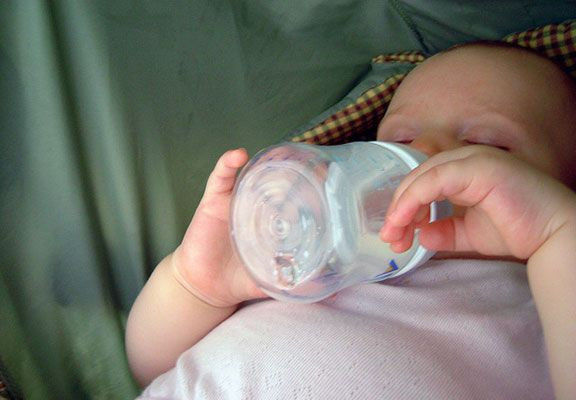Breastfeeding In China: Officials Promote Practice By Tightening Rules, Citing Infant Formula Risks

The Chinese government isn't giving up its attempt to revive breastfeeding in the country with one of the lowest percentages of mothers who breastfeed their babies, and said Tuesday that they would tighten rules on infant formula companies to help deter new parents from buying their products.
Twenty-eight percent of women in China breastfeed their children, according to the Wall Street Journal, which is significantly lower than the global average of 40 percent. Chinese officials announced their goal to raise that number to 50 percent by 2020. According to Dale Rutstein of UNICEF, China is considered one of the fastest-growing infant formula markets in the world — growing from around a $1 billion industry in 2002 to $9 billion this year. Asian infant formula companies use “unethical advertising practices” comparing products to mother’s milk, Rutstein said in an interview with the WSJ, and “there can never be…a legitimate comparison.”
The government’s new regulations state that infant formula products must have labels that promote breastfeeding and cannot be adorned with pictures of children. The Chinese food and drug watchdog will step up its requirements to make sure that milk powder is safe, and hospitals will no longer be allowed to receive gifts or advertising from infant formula companies. According to Reuters and Chinese state television, the infant product company Danone SA had bribed hospital staff to feed its milk powder to newborns, though the company denied it. Chinese authorities have also begun a crackdown on prices for international firms that produce baby formula, and Japan’s Meiji Holdings Co Ltd. has decided to pull out of China’s market due to the new restrictions.
Infant formula, though extremely popular among mothers, has had a controversial past in China. In 2008, six babies were killed and 300,000 sickened after eating melamine-tainted infant formula. Melamine is a chemical typically used in adhesives, plastics, dishware, and whiteboards. According to the World Health Organization (WHO), Chinese infant formula makers added melamine to their products to increase levels of nitrogen, making the formula appear to have higher levels of protein than it did. Watered down to increase volume, the products actually had lower levels of protein, so the melamine was used to “trick” measurements of its protein content.
Chinese mothers are often persuaded by aggressive marketing of infant formula makers and social pressures to turn to alternative means of feeding their babies. “Friends and family spared no effort in persuading me to give my daughter other food,” Xiaoyu Su said in a UNICEF report. “If you don’t hold your beliefs strongly, it’s very easy to be influenced by others and give up breastfeeding.” UNICEF also notes that there is a lack of facilities to allow mothers to breastfeed in public places and the workplace, and has started an initiative called 10m2ofLove that hopes to register public breastfeeding rooms in stores and buildings.
In a 2009 study, researchers concluded that formula feeding is linked to “adverse health outcomes for both mothers and infants,” and is associated with ovarian cancer, childhood cancer, type 1 diabetes, and asthma, though many past studies have come up with varying results. The study said that “[g]iven the compelling evidence for differences in health outcomes, breastfeeding should be acknowledged as the biologic norm for infant feeding,” and the longer a mother does it, the better, according to its proponents. “Breastfeeding is ideal for infants,” the Centers for Disease Control and Prevention (CDC) states quite simply on its website.
Meanwhile, in the U.S., breastfeeding is on the rise. The CDC released that in 2013, 77 percent of mothers have been breastfeeding their babies compared to the 71 percent a decade ago. “This is great news for the health of our nation because babies who are breastfed have lower risks of ear and gastrointestinal infections, diabetes and obesity, and mothers who breastfeed have lower risks of breast and ovarian cancers,” CDC Director Dr. Tom Frieden said in a press release.



























